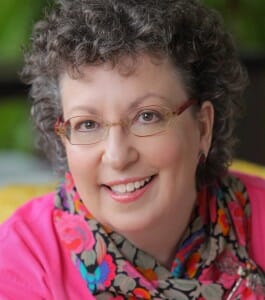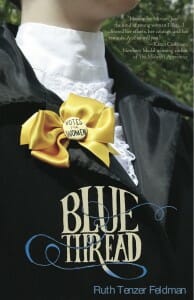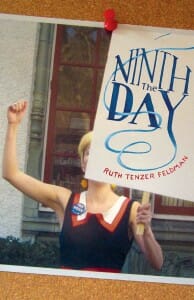
Today, I welcome Ruth Tenzer Feldman. She is the author of numerous non-fiction and fiction children’s books. In the last couple of years, she published the award-winning novel, Blue Thread and its companion The Ninth Day. Both books were written for a young adult audience, but adults can enjoy these historical fiction books as well.
In exchange for an honest review, I received a complimentary copy of The Ninth Day. I had previously purchased Blue Thread.
Commenters to this blog will be eligible for a book giveaway. See below.
Welcome Ruth.
Your website mentions that you had a successful career as a legislative attorney. Why did you decide to shift gears to become a young adult book author?
Writing has been my first love since elementary school, when I did a report on eye care from the point of view of the eye. My work as an attorney was satisfying, challenging, productive…but still basically a job. Somewhere in mid-life, my first love won out.
You started your children’s book writing career by authoring numerous books that are part of various non-fiction book series. What drew you to these historically based projects?
When I was an international relations major in college I began to realize that what we are (as individuals, families, nations) depends so much on what we were—or what we think we were. There’s so much story in history.
Blue Thread and The Ninth Day catapulted you into the realm of fiction. What prompted you to take this leap?
Well, to put it baldly, I had an urge to lie. I was writing the bio of U.S. president Calvin Coolidge, and I wondered what it would be like for the secret service guys who had to deal with Cal’s pranks. He was a practical joker, even in the White House). Did they ever play a trick on the president? That’s when I knew it was time to write fiction.
Did you start writing Blue Thread with the intention of writing additional books that shared the same theme? How many more books do you anticipate writing within this genre? When will the next book be available?
Blue Thread is one of many entanglements in a vast and imaginary universe in which the biblical traveler Serakh entwines teen girls from different times and places. I expect to write at least three books that draw on this universe. They are not exactly a series, in that they could be read in any order. The Ninth Day came out in Fall, 2013, and I’m working on Book Three now. There’s also an e-book, Life after Blue Thread, by (fictional) Florrie Steinbacher, that’s available for free on my website.
Now that you have written non-fiction and fiction books, do you have a preference for a particular genre?
Both genres pull at me. I’ll likely stay with fiction for the next couple of years at least. Then, who knows?
Blue Thread and The Ninth Day are a subcategory of time traveling adventures. In both books, you effectively intertwine two points in history. How did you select these corresponding time periods? Did you visualize all of the connections in advance or did your writing end up linking the dots together.
Good question! Blue Thread evolved, in that the story originally intertwined the biblical daughters of Zelophehad with U.S. civil rights issues in 1957. When my research unearthed a 1908 banner in Iowa that linked votes for women and the daughters of Zelophehad, I shifted the story to that authentic tie with the woman suffrage movement. In The Ninth Day, I linked 1964 Berkeley and 1099 Paris right from the start, but I didn’t know exactly why until I was part way into writing the book!
Why did you choose to have your main characters stand out as independent and strong willed Jewish female teenagers?
I used to be an independent and not very strong-willed Jewish teenager. I write about what I know and what I wish I had known.
Blue Thread and The Ninth Day include many aspects of Jewish culture and history. What feedback have you received from your non-Jewish readers?
My non-Jewish readers seem to be most interested with the feminist side of the story, and with the pursuit of justice—which I hope is a universal trait.
My audience might be interested in understanding the nuts and bolts of creating a book series. Can you share 3 tips for establishing a successful series?
Hmm…I’m not sure how well I can speak to creating an actual series, in which it’s important to read the books in a particular order. Here’s what helps me in my writing my three companion novels:
- Plot each book so that it can stand alone, giving the reader a satisfying ending.
- Make sure that the basic personality of any character who spans more than one book remains consistent. At the same time, give the character room to grow as (s)he faces challenges.
- Repeat whatever is truly essential for the reader to know in each story, without making it boring for someone who has read a companion novel. That way, you’ll avoid confusion and vamp up the surprise.
As you bounce back and forth between time periods, what methods do you use to hold your audience’s attention? How can your young adult readers keep track of the different places and time periods? How do you keep your readers interested with historical facts and personalities?
I aim to tell a good story, whether it’s in one time period or across time, and whether or not it incorporates real history. Each period has its unique problems, hurdles, and moments of joy. Each period also has its distinct culture, language, and setting, which can be “sign posts” for readers.
In your website bio you mention that your best writing coaches come from Viva Scriva. Have you always belonged to a writing group? How does these people support your writing goals? Where can my readers locate a similar group?
I’ve been a part of writing groups for about ten years. Viva Scriva is the third group I joined. They are my toughest critics, and my most exacting readers, and my strongest cheerleaders. We all write children’s books (from picture books through young adult) and we connected through the Oregon chapter of SCBWI, the Society of Children’s Writers and Illustrators. Many writers’ associations can help your readers find a critique group. My advice: find one with a mix of experience, and be willing to move on to a different group if the current one isn’t working for you.
Ruth, is there anything else that you would like to share with my audience?
Whether you are writing fiction or nonfiction, cultivate a sense of wonder about the world around you. Use some of that wonder to feed your writing, and share the rest.
Award:
- Blue Thread- Winner, 2013 Oregon Book Award-Leslie Bradshaw Award for Young Adult Literature
Book Giveaway
Anyone who leaves a comment on this blog by Sunday, May 11 will be eligible for a book giveaway. The randomly selected winner will be sent an autographed copy of one of Ruth Tenzer Feldman’s books.
Related Blogs:
Q & A With Laura DeBruce, Author of The Riddle of Prague
Q & A With Frank Nappi, Mickey Tussler Series
Multicultural Picture Book- Benjamin of Tudela
Time Traveling Back to the Dreyfus Affair


Leave a Reply
You must be logged in to post a comment.